
The Noctuidae, commonly known as owlet moths, cutworms or armyworms, are a family of moths. They are considered the most controversial family in the superfamily Noctuoidea because many of the clades are constantly changing, along with the other families of the Noctuoidea. It was considered the largest family in Lepidoptera for a long time, but after regrouping Lymantriinae, Catocalinae and Calpinae within the family Erebidae, the latter holds this title now. Currently, Noctuidae is the second largest family in Noctuoidea, with about 1,089 genera and 11,772 species. This classification is still contingent, as more changes continue to appear between Noctuidae and Erebidae.
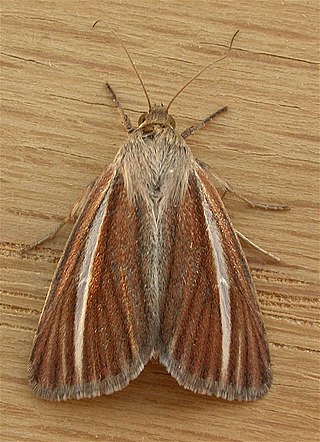
Heliocheilus cramboides is a moth of the family Noctuidae. It is found in Victoria, Western Australia, the Australian Capital Territory, New South Wales, the Northern Territory, Queensland and South Australia.

Idia is a genus of litter moths of the family Erebidae first described by Jacob Hübner in 1813.
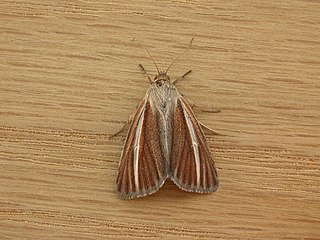
Heliocheilus is a genus of moths of the family Noctuidae. Former synonyms include Canthylidia.

Heliocheilus cistella is a moth in the family Noctuidae. It is found in the Australian states of Northern Territories, Queensland and Western Australia.

Heliocheilus mesoleuca is a moth in the family Noctuidae first described by Oswald Bertram Lower in 1902. It is found in Australia in New South Wales, the Northern Territory, Queensland and South Australia.

Heliocheilus confertissima is a species of moth of the family Noctuidae. It is found from Northern Africa to the Middle East, including Saudi Arabia, Iran and Oman.

Heliocheilus paradoxus, the paradoxical grass moth, is a species of moth of the family Noctuidae. It is found from Ontario and British Columbia, south to at least California, Arizona, Texas and Florida.

Heliothinae is a small, cosmopolitan subfamily of moths in the family Noctuidae, with about 400 described species worldwide. It includes a number of economically significant agricultural pest species, such as Helicoverpa armigera and Helicoverpa zea.
Heliocheilus albivenata is a moth in the family Noctuidae. It is endemic to Western Australia.
Heliocheilus ferruginosa is a moth in the family Noctuidae. It is endemic to the Northern Territory, Queensland and Western Australia.
Heliocheilus fumata is a moth in the family Noctuidae. It is endemic to Queensland.

Heliocheilus turbata, the spotted straw moth, is a moth in the family Noctuidae. It is found in North America, including Georgia.
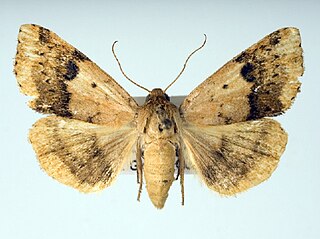
Heliocheilus lupatus, the purple topper, lupatus straw moth or spotted straw moth, is a moth in the family Noctuidae. The species was first described by Augustus Radcliffe Grote in 1875. It is found in the United States from Kentucky and central Connecticut south to Florida and Texas.
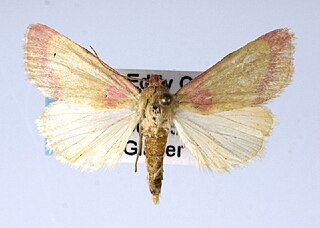
Heliocheilus toralis is a moth in the family Noctuidae. It is found in North America, including Arizona and Texas.
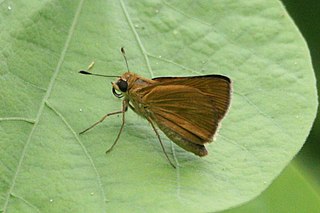
Nastra julia, the Julia's skipper, is a species of butterfly in the family Hesperiidae. It is found in North America from southern Texas to central Mexico.
Heliocheilus albipunctella, the millet head miner moth, is a moth in the family Noctuidae. It is found in the Sahelian region of West Africa.
Heliocheilus thomalae is a moth in the family Noctuidae. It is found in Tanzania.

A MONA number, or Hodges number after Ronald W. Hodges, is part of a numbering system for North American moths found north of Mexico in the Continental United States and Canada, as well as the island of Greenland. Introduced in 1983 by Hodges through the publication of Check List of the Lepidoptera of America North of Mexico, the system began an ongoing numeration process in order to compile a list of the over 12,000 moths of North America north of Mexico. The system numbers moths within the same family close together for identification purposes. For example, the species Epimartyria auricrinella begins the numbering system at 0001 while Epimartyria pardella is numbered 0002.













